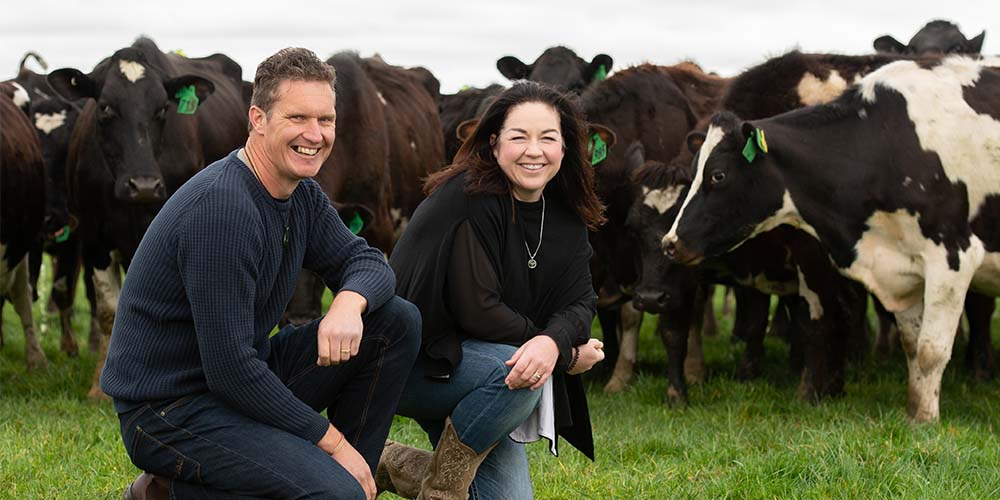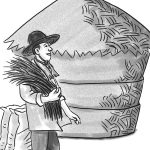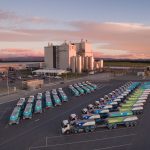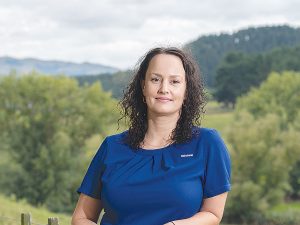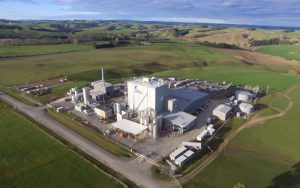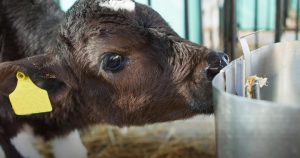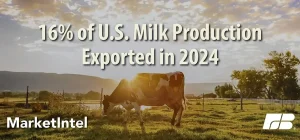
The Millers are lower order sharemilkers on a 273ha farm owned by Andrew and Rachele Morris, milking 925 cows near Carew, south of Ashburton in Mid Canterbury.
“For us the whole reason why we’re here is for our people, for positive impact, not just profit,” Rebecca says.
“The old game was profit but if we have a positive impact with our people, profit will come anyway.”
The couple, who operate as MilkIQ /River Terrace Dairy, were joint runners-up in this year’s Dairy Business of the Year supreme award with Waikato farmers Richard and Nadine McCullough from McCullough Farm Partnership. They also took home the Best Canterbury Farm Performance, Business Resilience and Best People Leadership awards.
Though the judges said it was unusual for two runner-up farms to be chosen – it was the first time in DBOY’s 12-year history – they could not be separated.
“The People Performance Award shows they have been able to achieve their financial results while caring for their people,” the judges said.
Running a tight ship with good cost control ensured their win in the Business Resilience category.
River Terrace Dairy had the lowest cost of production at $3.84/kg MS, operating expenses are contained to 40% of gross revenue and a very good pasture harvest of 15.5 tonnes of drymatter a hectare with pasture being 78% pf all consumed feed.
They achieved an impressive 495kg MS a cow. The awards used data from the 2017-18 season.
This season they have also taken over the Morris’s second farm, a 389ha property carrying 1450 cows.
They say that with their staff’s help they are confident they can run both operations effectively and efficiently. They hope the second farm will achieve as highly as the first using the same award-winning system.
“We have low costs, high production and are lucky our staff turnover is virtually nil,” Rebecca says.
“We have worked hard to create a good team culture. We talk to people, are honest and try to establish trust.
“We ask our team what it is that they want to achieve so we can help them attain their goals. This helps us to achieve ours.”
Their people-first philosophy has evolved over the more than 10 years they have been dairy farming.
Rebecca, the daughter of dairy farmers, grew up immersed in farm life. Her parents worked their way up the career ladder through contract milking, sharemilking and eventually to farm ownership in Whangarei.
“I did shift round a lot growing up,” Rebecca says.
“Mum and Dad farmed in Waikato, in Waiau Pa near Pukekohe, Wellsford, Warkworth, Edgecumbe, Taneatua and Thornton in Bay of Plenty so I’ve seen a lot of farming systems and environments and we were always helping out down on the farm.”
But when she left school Rebecca didn’t want to go farming because she wanted to study tourism and graphic design at Waikato Polytech.
“I thought, this is where I’m at.”
She worked for a travel wholesaler then joined American Express and started moving up the ranks there.
“Then she married me,” interrupts Brent, adding that soon they were dairy farming together.
Brent was originally from Christchurch but when he was teenager his parents bought 26 hectares near Oxford and moved the family to the country.
“I got a bit of work on sheep and beef and deer farms and then went and completed a diploma in agriculture at Telford.”
At Telford he not only learned about agriculture, he also met and made friends with Rebecca’s brother Graham, who in turn introduced him to Rebecca in 1997.
After graduating Brent worked on dairy farms in Canterbury then went to the West Coast for two years. When he returned to Canterbury he went flatting with Graham.
“Beck came down to visit. She went back north for a couple of weeks and then came back and never left,” Brent recalls.
They found work on dairy farms in Culverden, married in 2006 and started a family. They have three children, Blake, 14, Blair, 1, and Rhianna, 9.
As they moved from farm to farm they worked for various people, each with their own management style. The most valuable thing they learnt and use to this day is the old adage of treating others how you would want to be treated yourself.
“It just opened up our eyes. I’d worked in town so I could reflect upon how with American Express they really trained us intensively but also took care of us,” Rebecca says.
“So safety is important to us. It is not about a protective vest but psychological safety, the safety of the mind.
“At Amex it was about keeping us happy because if we were happy then the customer was happy.
“That’s the magic in our recipe. We do everything possible to keep our people happy. They’re keeping everything else happy, which means everybody’s happy. It is a full circle going round and round.”
After a few years they took a job managing the Morris farm, by which time they had firm ideas about treating staff positively and the impact happy staff can have on their bottom line.
They are still working with the same staff they brought with them from the previous job.
They have formed a close bond with their staff and the owner and see them as family and friends so are proud to have won the Best People Leadership award.
“We just say, hey, I’m here for you and these are the parameters because everyone has a different style or method of doing things and works at different rates. But at the end of the day, if the job gets done .well then everyone is happy,” Rebecca says.
Brent adds “There are the basic principles of the farm – like milking the cow out properly and feeding the cows right and there are overall principles of what we do in our job every day – but how we get to the end result is up to the individual team member if that is the task they have been assigned.
“If we give them the freedom to do their job without micro-managing then everyone is happy,” he says.
“This has only been reached by mutual respect and trust between all our team members.”
They also believe the farm can also grow food for the team and have begun planting fruit trees for the future.
“We understand that it will take time to grow but we feel that we need to start somewhere.
“If we can lower expenses for our team, albeit eventually, then they will have more cash in the bank.”
Attention to detail by both management and staff is one of the key ingredients of the Millers’ farming recipe and they actively involve their team making management decisions for the operation where practicable.
The staff do their own rosters, working out between them who works when, fitting in with the overall staff requirements set by the Millers.
“Everyone on farm has a family and they want to know when their days off are so they can plan far in advance.
“We have given them the power and responsibility of rostering but we do keep an eye on it so everyone is happy,” Brent says.
“There are basic parameters of how this farm is running so they have to be met. There are times when everyone has to pitch in such as calving. We can’t have three people off and only one working but we let them take responsibility for that.”
Rather than having a pyramid-type management structure they aim for something flatter where everyone has responsibility and accountability. Practically, that means everyone knows how to do every job on the farm and they’re trained that way from the moment they join.
If, for example, there is tractor work to be done while the usual tractor driver is on his days off, someone else can fill that role. One staff member does most of the maintenance on the farm but if need be there is another team member who has been trained for that too.
“If they don’t have the variety or feel they can add value they get bored, which does not create a good team culture,” Rebecca says.
She loves writing quotes.“Team culture is not created with a policy or procedure – you bring the culture.”
Last season they produced 562,816kg MS and are targeting 575,000kg MS this season.
They run a System 4 with the focus mainly on pasture but use supplement in the shoulders of the season to extend lactation.
Brent says they keep a close eye on things and do farm walks twice a week because feed supply and quality can change sharply in a few days and have an almost instant effect on production.
And their team is also very aware how important feed quality is.
“Everyone’s keeping an eye on those feeding levels and the grass residuals in the paddock.”
“The team knows when it gets down to a certain point they have the autonomy to shift them to the new break so instead of all the cows standing at the gate hungry they’re are shifted to new grass,” Rebecca says.
“The thing is we’re all making the timely decisions, it isn’t just me. It’s not just us running round making the decisions and the rest of them doing what they’re told. The team can make the decision to feed them when they need to be fed,” Brent adds.
“The use of time as a responsive tool has become one of our biggest assets in reaching our targets.”
They grow 10ha of beet on the milking platform for autumn and winter transitioning feed. Grain and palm kernel are fed in spring and palm kernel in autumn where needed.
Any non performing paddocks are sprayed and drilled with new pasture. That is determined from Minda land and feed data history.
“We are vigilant at keeping records and four years’ worth of data that we can draw from,” Brent says.
“The weakest paddocks are chosen to go into autumn beet and are regrassed the following year.”
GPS soil sampling is done over the whole farm every three years, which they say is a game-changer and has been instrumental in keeping their capital fertiliser costs down by applying fertiliser only through variable rate application.
The herd is wintered on the 75ha support block where it is fed kale, beet, balage and straw.
The heifers begin calving on July 25 and the herd a week later on August 1. They aim to keep about 25% heifer replacements and excess calves are also kept and reared.
Weaning target is 100kg for the Friesian calves and 90kg for the Jersey calves. In December calves are sent to the support block and return as in-calf heifers.
Premating heats are recorded from August 31 and non-cycling cows identified and Metrichecked and treated using the Off Sync programme.
Mating begins on October 25 and AI is done for six weeks using daughter-proven semen followed by three weeks of short gestation and the bulls go out until January 3.
As if they didn’t have enough to do running two farms and managing eight staff the Millers are also involved in a number of other farming activities. Rebecca was the local convener of the Women’s Dairy Network for four years and last year completed the Kellogg rural leader’s project – and from that has grown an idea for a new business.
She is developing a new website called Land Events, aiming to stop duplication of rural events by putting all the information in one place.
“I found that a lot of events were being duplicated with the same topic at the same time targeting the same people using the same levy and I was like ‘Wow, I put this event on and the bank has a finance seminar on at the same time and I only have 10 people here’,” she says.
Rebecca is also writing a book titled Embrace the Intangible, which will cover their people-first management system. She and Brent have trademarked a new word, Farmily, which encapsulates their management philosophy and in time plan to set up a consultancy.
“Everything that we do on-farm is actually something you can bring to the table. It’s not something that you can buy. Tangible is something I can buy, like a cup, but you can’t buy an attitude, you can’t buy an emotion, you’ve to actually be the change you wish to see.
“For me it truly is transformational when you understand that it comes back to behaviour and attitude. If you’re an employer of people there are tricks and tips you can learn to create a resilient team culture where people want to work with you and don’t need to leave.”
Away from the farm they love going camping with the kids and use their caravan to travel and discover new places.
“Over the last couple of years we have travelled to Nelson, Takaka and discovered Quinney’s Bush campground which is a great place to relax.”
The children have been involved in swimming, athletics and rugby so that keeps them busy too.
“We always have dinner at the table to reconnect and talk about everyone’s day. Our one goal every day is to spend time with each of our children to connect and listen,” Rebecca says.
Looking ahead they eventually want to enter an equity partnership or partnership while helping others in the industry.
“We want to help as many as people in the industry as possible, in any way we can whether that be through our website or the consulting business that is in the pipeline,” they say.
River Terrace Dairy KPIs
Total cows: 925
Effective area: 270.5ha
Milk: 495kg MS/cow, 1692kg MS/ha
Return on capital: 7.5%
Operating profit margin: 42.4%
Operating profit: $5286/ha
Cost of production: $3.84/kg MS
Operating expenses $4.24/kg MS
Pasture harvest: 15.5t DM/ha
Pasture % of feed: 78.2%
Core cost/cow: $655
Labour efficiency: 212 cows/FTE
Environ Score (out of 15): 10.3
HR Score (out of 15): 10.8
Fact box
Farm owners: Andrew and Rachele Morris
Sharemilkers: Brent and Rebecca Miller
Location: Carew, Mid Canterbury
Size: 273ha, support block 75ha
Cows: 925 Friesian-cross (2017-18)
Production: 2017-18 – 457,679kg MS
Production 2018-19: 562,816kg MS from 1125 cows 318ha
Target 2019-2020: 575,000kg MS from 1150 cows 318ha
Farm working expenses – $3.84/kg MS
